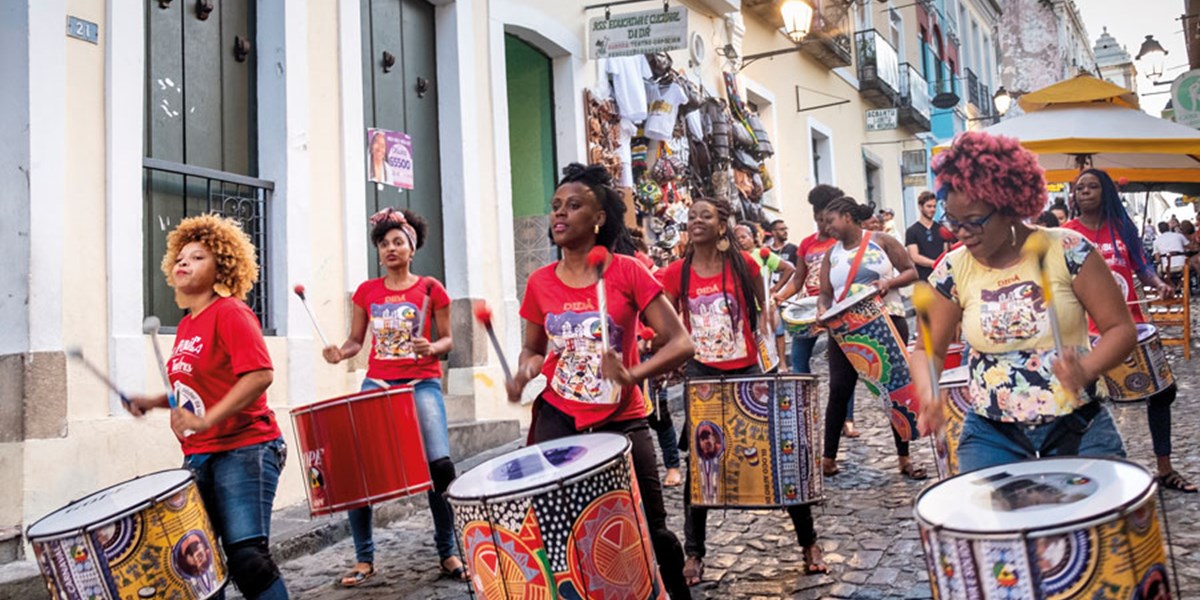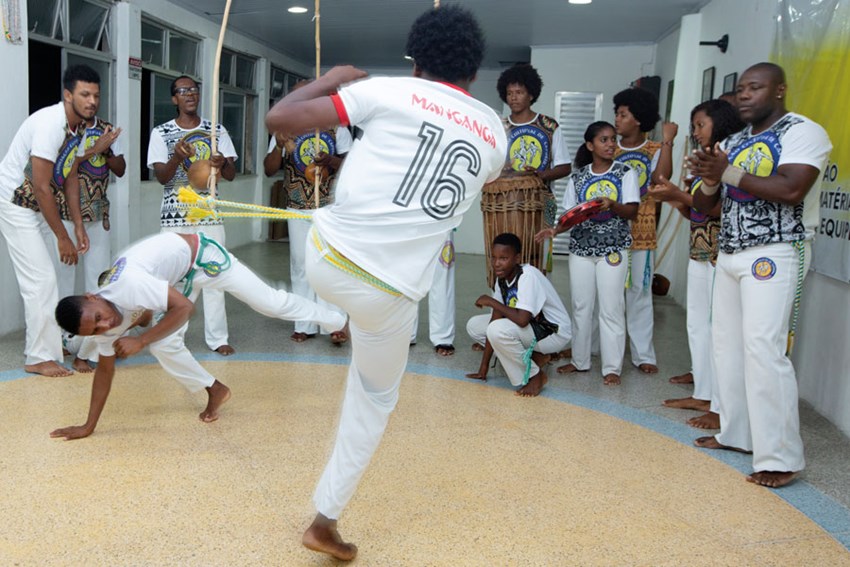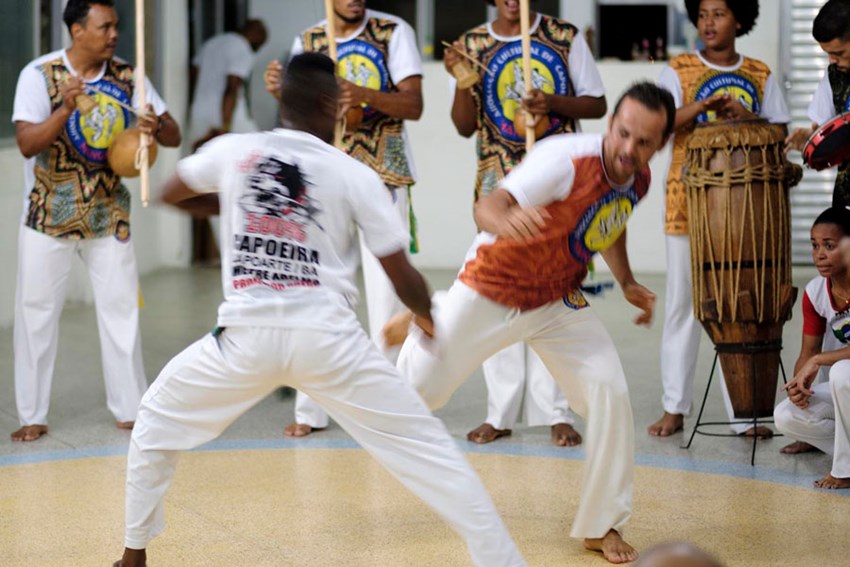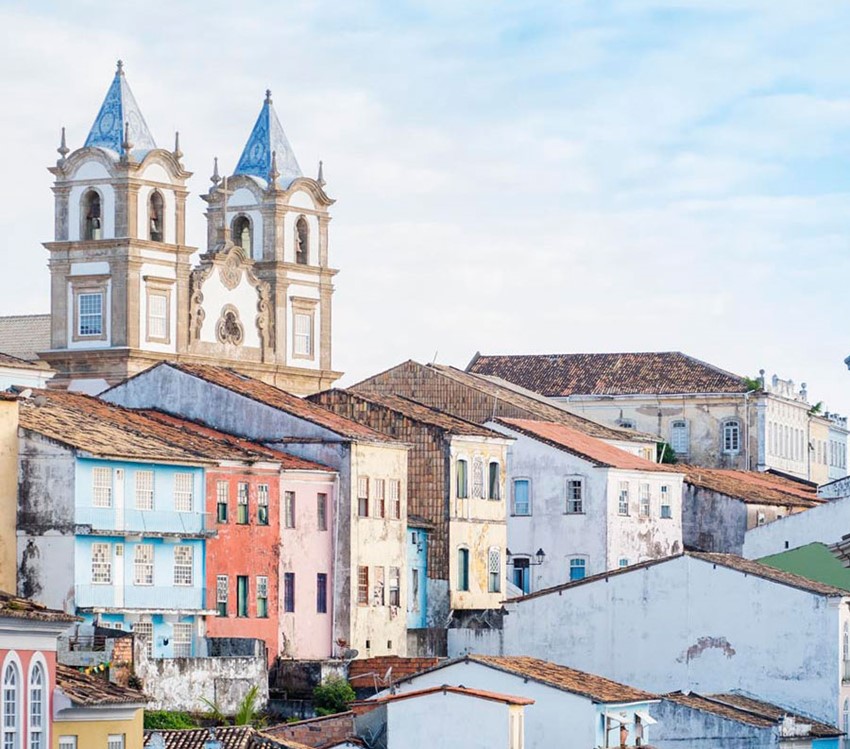Tuesday, January 8, 2019
What Next for Brazil?
Bolsonaro’s election win and incendiary rhetoric have brought uncertainty and division to the country. Alex Robinson reports from Salvador where its deeply rooted Afro-Brazilian culture is under fire

(All photographs by Alex Robinson)
“Don’t go,” warns the off-duty police officer, “that favela is up-in-arms, angry, dangerous.” But we go anyway, snaking up from the tidy main road along a narrow street lined by breeze blocks. And I am nervous. Not because of the warning; not because we are driving into one of Salvador’s largest slums, but because Brazil hasn’t been this tense in half a century.
It’s election time and the battlefronts are reforming in the country’s age-old class war: north and south, poor and rich, African-indigenous and European. After years of corruption scandals and high crime rates, Brazilians are rightly disillusioned. But many are turning to a demagogue for a cure – Jair Bolsonaro. This firebrand former army captain will, he says, end all corruption, waste and violent crime. He promises to jail the left-wing opposition, give police license to kill, radically cut funding for the arts, social projects and the environment. He targets minorities and the poor, especially if they are gay, indigenous or Afro-Brazilian. The wealthy south-east love him. The poor north-east fear him. I’ve never seen Brazil so volatile. So polarised.
“We’ll be fine,” says Conor O’Sullivan, my Salvador-based Cork guide. And he should know. He has lived here for over 20 years. Few locals know the city better. Or are more respected. “Tonho Matéria has invited us. The community know we’re coming, that’s what matters.”

Scantily-built favelas line the Salvadorian landscape
We draw up outside a ramshackle building on a dusty corner. Tonho is waiting under a dim street light, lean as track athlete, handsome as a Motown singer, 50-something but looking ten years younger, face in a huge smile.
“Welcome,” he says, embracing us. “Thank you for coming.” And he beckons us to follow him to the capoeira centre.
Tonho Matéria is one of Brazil’s most important musicians. You may never have heard of him. But you’ve heard the band he fronted, Olodum. They played on Paul Simon’s Rhythm of the Saints album, on Michael Jackson’s ‘They Don’t Care About Us’. They’re the percussionists you think of when you think of Brazilian percussion – that pounding, infectious multi-drum heartbeat, driven by deep sonorous surdo and the rat-tat-tat of caixas (snares) and repiniques. The beautiful, soaring, soulful voice that floats above the rhythms is Tonho’s.
And Paul Simon had it right. That Olodum sound is the rhythm of the saints: the African orixa saints – archetypal powers of the psyche and nature itself, celebrated in the rituals of Candomblé, Brazil’s counterpart to Haitian voodoo and remembered and revitalised through distinct rhythms.
Almost all Brazilian rhythms, Tonho tells me, have their roots in the Candomblé rhythms of the orixas – from samba and bossa nova to afoxé and the fight-dance of capoeira. And Tonho is a capoeira master. I am here to see his capoeira school, Mangangá.
“Capoeira is central to our culture. It holds the community together,” says Tonho. “It gives our young people a horizon – discipline, direction, and most importantly rooted cultural identity.”

Capoeiristas practise their routines at the local centre run by Tonho Matéria
Africans enslaved in Brazil to work on the sugar plantations never forgot their origins. Africa was preserved through ritual and rhythm. While Candomblé was kept a secret – practiced in sacred, secluded natural areas called terreiros, the orixas were remembered publicly as Catholic saints. Ogun, the spirit of fatherhood was venerated as Saint George. Yemanjá, spirit of the sea, as the Virgin Mary. Candomblé rhythms were incorporated into social events and developed. Musical get-togethers became sambas de roda (samba circles), the progenitors of the samba, which is associated with Brazil to this day. Festivities became carnival. Dances merged with martial arts used against the Portuguese slave owners, as capoeira.
“Capoeira rhythms have ritual meanings rooted in Candomblé,” Tonho says, “but they also function as coded messages.” And he picks up a berimbau – a stringed percussion instrument, and plays a regular rhythmic twang. “That means welcome,” he says, “and this one,” he continues, playing a more percussive beat, “is the toque de aviso – the warning beat. It means trouble, the Portuguese are coming!”
By now we are at the capoeira centre – a big hall perched on a hill overlooking a valley filled with favela houses. The sun has set and the house lights are twinkling like stars. Music drifts from somewhere below. In the building next to us, a family is watching TV, kids are laughing. Inside the hall a young hipster is stringing a smaller berimbau – using wire from an old tyre. Another is tuning a drum. Dozens of young men are arriving, dressed in white capoeira trousers. They shake hands deferentially with Tonho, say “salve” in greeting, stretch and practice their moves.
Then the circle forms, the berimbaus play, the percussion strikes up and as Tonho sings, the first capoeiristas enter the ring – a spry 50-year-old woman and a fit man with muscles like chords. They spin and swirl at effortless speed. A young boy, no more than ten, replaces one, then an older man with a grey beard, all swinging with fluid grace around the emblem of the Mangangá school, which is etched into the floor like a giant badge.

Tonho Matéria's capoeira class at the Associacao Cultural Manganga
My guide O’Sullivan is pulled into the circle. Then me. And with all that positive energy I manage a capoeira ginga – the three-way step that lies behind all the moves. It’s the first time I’ve mastered it, and after my stint in the circle I sit down, sweaty, panting and filled with grinning, boyish pleasure at my achievement.
Back in the city centre, and outside the hotel, two young Brazilians are in a heated discussion. Bolsonaro plans to abolish the Ministry of Culture, says one, to suspend the art grant… it will be the end of culture in Brazil. No, says the other, he will end corruption, stop artists and community charities creaming off wealth at the tax-payers expense. I bypass them and go up to my room and switch on the television. He’s there again, “Deus acima de tudo,” he shouts, (God above all), “Brasil nao e um estado laico nao, é um Estado cristão!” (Brazil is not a secular state, it’s a Christian state). But who is Bolsonaro’s Christ, I wonder?
The next morning, I visit the Pelourinho – Salvador’s old colonial heart (and modern-day UNESCO World Heritage site). The area brims with baroque churches and brightly-painted town houses that clamber up hilly, cobbled streets. This is where Olodum originated, in the days when the Pelourinho was falling down, abandoned by all but Afro-Brazilians. It’s tidy now, tourist-busy and Sunday, so the bells are ringing in the towers of the eggshell-blue church of Nossa Senhora do Rosario dos Pretos. It’s the African church, built by slaves for slaves during time-off from working on the wealthier churches up the hill, in which they were prohibited from worship. I am here to attend the African mass, dedicated to the Christ of the Afro-Brazilians, a Christ who will be unwelcome in Bolsonaro’s Christian state. A Christ whose followers have for the last five years been increasingly persecuted with arson, vandalism and violence by other Brazilian Christians.

The historic Portuguese colonial centre of Salvador
The priest, Padre Lazaro is outside the church, as large and cheerful as Friar Tuck, calling parishioners in to mass. He shambles through the door and the band strikes up in African percussion. I recognise some of the rhythms as belonging to Candomblé. They accompany the opening hymn, the liturgy, the offertory. I kneel as the eucharist is brought to the altar by elderly and reverential Afro-Brazilians – the body and blood of He who died for us all, says Father Lazaro. The Christ of All, remembered with Candomblé percussion, remembered with the orixas. I look up and see the blue eyes of the church’s most famous saint – São Benedito – looking over me, from an ancient, carved, African face.
Outside in the glare of the sun, there are more drums. I follow their sound, past shops selling berimbaus, and stalls where baianas dressed in huge gowns sell sweet-smelling African acarajé bean patties. The drummers are from Banda Didá, Salvador’s most famous all-female percussion band, who are parading outside the Afro-Brazilian cultural museum. The music is viscerally powerful, the women beautiful. All seems well with the world. O’Sullivan meets me there and whisks me out along the coast to the outskirts of the city and Abaeté neighbourhood.

All-female samba-reggae band Didá parade through Salvador’s picturesque cobbled streets
Next to a beautiful dune lake, under shady trees members of the Casa da Música Abaeté community are forming another musical circle, as old as capoeira. We draw up chairs. Percussionists, playing among other things pandeiro (tambourine) and tamborim, guitarists and cavaquinho players arrive, join us and idly chat. There are young students, elderly men, housewives and husbands, lawyers and professional musicians. As more arrive, the circle gets bigger and bigger. Nothing happens. Then from nowhere the music begins – samba with its unmistakable walking heartbeat rhythm, its sweet melodies, its jangling strings. When one piece ends another singer takes the mic, introduces a new song with a story. He talks about how samba changed his life, about his love for the community, and then everyone in the circle plays together. Just as they have done all over Bahia for centuries. As the afternoon lengthens, women enter the circle and start to dance, swinging, laughing, jilting. And it’s impossible not to be moved. Even I tap and clap and feel part of this circle of samba, this samba de roda.
In the evening, we drop into a bar in the city’s fashionable Rio Vermelho district. And Jair Bolsonaro is there again. On a podium on the TV on the wall, gesticulating, rousing, energising. Outside in the street young people with smiles are handing out flyers for his party.
I look at O’Sullivan. Surely this man is going nowhere. He’s called African refugees “the scum of the earth,” he’s claimed that “if you really look at history, the Portuguese didn’t even set foot in Africa. The Blacks themselves turned over the slaves.” How can he win in Brazil, the country with Africa at its heart? O’Sullivan points to the dozens of blocks of flats lying a little inland, each of them with a generous balcony, parking for several cars, and sea views. “Pretty much everyone in those buildings will be voting for Bolsonaro,” he tells me, “and everyone who identifies with them.”
But the bar man has had enough. He switches off Bolsonaro and puts on some music, by Salvador band of the moment, BaianaSystem, who played their very first concerts right here in Rio Vermelho. BaianaSystem sing:
‘Divi-divi-divi-dividir Salvador,
Diz em que cidade você que se encaixa,
Cidade alta ou cidade baixa…que cidade que você.’
(Divided Salvador, tell me in which city you fit in,
upper city or lower city, which city are you?)

Salvador band of the moment, BaianaSystem
About a month later, the rain is pouring outside my London window and the sun and energy of Bahia seems very far away. The television is switched on. After news items on Brexit negotiations, sanctions against Iran and Trump’s latest Twitter rant, a sober BBC reporter announces that Brazil’s ‘far-right candidate, Jair Bolsonaro’ has won the presidency of the largest South American nation.
I think back to Bahia, to Tonho, Father Lazaro, to the Candomblé mass and the centuries-old samba de roda at the Casa da Música. To BaianaSystem playing in that bar in Rio Vermelho. And I send a desperate email to their lead singer, Roberto Barreto. What will happen? I ask. Will it all be all right? He responds quickly.
‘Bolsonaro has demonstrated a complete lack of understanding about the cultural richness and diversity of our country, making aggressive and prejudiced statements about indigenous, black and north-eastern people, about the role of women… about the very bedrock of our culture. As far as expectations go, I would say they are the worst possible…’
+ Check out our Bahia Spotify playlist at: www.bit.ly/songlinesspotify
+ This article originally appeared in Songlines #144. To find out more about subscribing to Songlines please visit: Subscription offers

